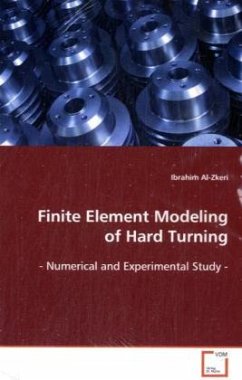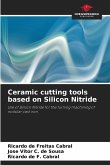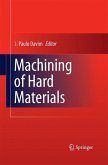Due to its favorable effects on the machined
surface, hard turning processes are replacing
grinding for finishing various mechanical components
of hardened steels such as transmission shafts,
bearings and gears.
During hard turning, the cutting tool is exposed to
a very severe environment. The specific cutting
stresses and the temperatures are high. For a tool
to perform successfully under these severe
conditions and to have a good surface quality,
factors such as the cutting tool edge geometry, feed
rate, and cutting speed have to be carefully
selected.
In this study, the finite element method (FEM) is
used as a tool for understanding the fundamentals of
hard turning process and for the prediction of the
effect of CBN tool edge preparation and cutting
conditions on the process variables. In addition, a
methodology for obtaining flow stress data for
machining simulations from machining and compression
tests has been developed. Since practical hard
turning is a 3D process, two numerical methods are
used to study te process: 1) simplification of the
3D hard turning process using an analytical model
and 2D FEM and 2) 3D FEM.
surface, hard turning processes are replacing
grinding for finishing various mechanical components
of hardened steels such as transmission shafts,
bearings and gears.
During hard turning, the cutting tool is exposed to
a very severe environment. The specific cutting
stresses and the temperatures are high. For a tool
to perform successfully under these severe
conditions and to have a good surface quality,
factors such as the cutting tool edge geometry, feed
rate, and cutting speed have to be carefully
selected.
In this study, the finite element method (FEM) is
used as a tool for understanding the fundamentals of
hard turning process and for the prediction of the
effect of CBN tool edge preparation and cutting
conditions on the process variables. In addition, a
methodology for obtaining flow stress data for
machining simulations from machining and compression
tests has been developed. Since practical hard
turning is a 3D process, two numerical methods are
used to study te process: 1) simplification of the
3D hard turning process using an analytical model
and 2D FEM and 2) 3D FEM.








